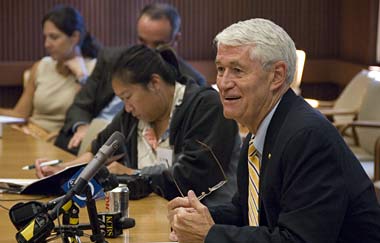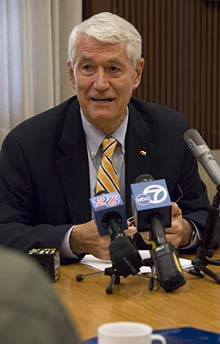UC Berkeley Web Feature
| Chancellor Robert Birgeneau discussed his priorities for the coming school year, including keeping a Berkeley education affordable and promoting social outreach efforts. (Steve McConnell/ NewsCenter photo) |  |
Meeting with the media
At his annual press conference, Chancellor Birgeneau briefs reporters on the biggest campus stories of the year ahead
BERKELEY – In a wide-ranging back-to-school press conference today (Thursday, Aug. 23), UC Berkeley Chancellor Robert J. Birgeneau set out his agenda for the year ahead, reported on what he called "amazing progress" in the campus initiative to further energy research, proposed a solution for more scholarship aid for the poorest students, and addressed a call for major changes in the administrative practices of the University of California system.
"This is probably the week that I love the most as chancellor, because it is the week our new students appear," said Birgeneau in opening the press conference. "I encourage them to take full advantage of life on the campus and in the city of Berkeley. I also encourage the students to become involved in some social-outreach program, whether it is with homeless people or tutoring in Berkeley schools."
Birgeneau said he and Oakland Mayor Ron Dellums have been brainstorming ways to involve UC Berkeley students and faculty in social-outreach efforts there. "We have a lot of expertise here, and we have a lot of idealistic young people who would like to contribute," said Birgeneau.
Dellums will soon come to campus to meet with Birgeneau, campus deans, and administration leaders. "The mayor is very clear-thinking about the challenges Oakland faces," Birgeneau said, "but in also saying that Oakland is a microcosm of urban life in America. If we can't solve the problems in Oakland, we're not going to be able to solve them nationally."
 A public-private endowment partnership 'would guarantee that the University of California would always be accessible for students from the poorest backgrounds, which I believe is the fundamental responsibility for the University of California as a public university.' -Chancellor Robert Birgeneau |
In addressing the need to help the lowest-income students attend Berkeley, Birgeneau drew reporters' attention to an op-ed piece he'd had published in the San Francisco Chronicle earlier this week. He said that while the UC Regents have raised student fees, the cost of attending Berkeley has decreased for the poorest students. The campus has, through careful economizing and cost management, along with increased state and federal aid, lowered the self-help level — the amount of money from work or loans a student receiving financial aid is required to contribute annually — from $8,600 to $8,000 over the past two years.
"One of the challenges we have in the immediate future," he said, "is that we've made all of the savings that we can in order to get that number down. We predict that over the next five years that number could increase from $8,000 to as much as $12,000 — and that's really just not acceptable."
In his op-ed, Birgeneau explained his idea for a new public-private partnership in which every dollar a donor gives toward financial aid would be matched by the state government. "If the government is willing to fund this at the level of $150 million a year for the next seven years," the chancellor told the media on Thursday, "and if the fundraising was successful — not just for Berkeley but for the entire UC system — then that would provide enough resources for the indefinite future, because there would be an endowment."
Such a fund, he concluded, "would guarantee that the University of California would always be accessible for students from the poorest backgrounds, which I believe is the fundamental responsibility for the University of California as a public university."
Birgeneau was asked by one reporter whether he was interested in presidency of the UC system when UC President Robert Dynes steps down. The chancellor's response was both unequivocal and leavened with humor. "Absolutely not," said Birgeneau. Then, smiling, he added that his wife, Mary Catherine, has already informed him that if he even considered pursuing the position, she would relocate to and join their children on the East Coast.
Questions also came up relating to news reports about far-reaching changes to the UC management structure and operations sought by Richard Blum, chairman of the UC Board of Regents. Birgeneau said the focus of Blum's criticism was directed at systemwide regulations and problems but added that the Berkeley campus was streamlining processes, working to manage capital projects better, and is moving toward making UC more affordable with ideas such as the public-private scholarship endowment.
"We continue, on the individual campuses, to sustain a world-class educational environment. We have significant challenges, but we are also making significant progress and I think we have very clear ideas of how to move forward to make the system work better," he said.
On another topic, Birgeneau referenced the upcoming Sept. 19 court hearing over the proposed Student-Athlete High Performance Center, slated for construction adjacent to Memorial Stadium. The campus is being sued by a coalition of plaintiffs, including the City of Berkeley and a group of neighbors, on the strength of concerns over seismic safety and neighborhood impact. The campus is making the case — bolstered by engineering reports — that the proposed site is safe to build on.
"We're very hopeful that the judge will rule in our favor and that we will be able to go forward," Birgeneau said, adding that the campus is interested in working with Berkeley Mayor Tom Bates and the city council to settle the matter before the court date. The project's delays, he emphasized, have "increased the cost of the stadium and extended the period in which our student-athletes' safety is at risk."
Changing his focus to key matters of academic and administrative significance, the chancellor talked about the recent appointment of astronomy professor Gibor Basri to the newly created campus post of vice chancellor for equity and inclusion. He spoke about two soon-to-be-unveiled research facilities: The new Stanley Hall, which will house the California Institute for Quantitative Biosciences (QB3), and the C.V. Starr East Asian Library/Chang-Lin Tien Center for East Asian Studies, nearly completed in the center of campus. He also mentioned that, early in 2008, seismically poor Warren Hall will be demolished to make way for a five-story Li Ka Shing Center for Biomedical and Health Sciences, where research and teaching on the biological basis for disease will take place.
Wrapping things up, Birgeneau recalled that when he was questioned about the campus's academic plans at last year's media conference, he had told reporters that he and Steven Chu, director of Lawrence Berkeley National Laboratory, were hard at work on strategies the campus and LBNL could employ to address energy self-sufficiency on statewide and national levels. Those plans, he said, had evolved into a probable funding stream of $85 million a year for as long as the next 10 years. "I have never seen anything progress so rapidly in my life," he said.
